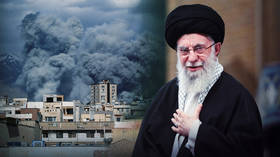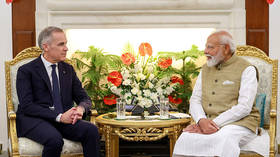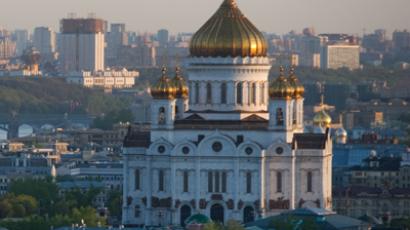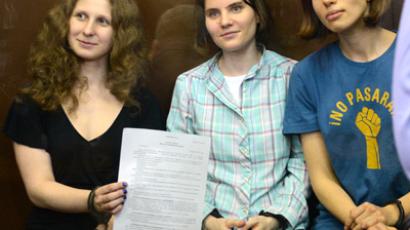Pussy Riot spotlight takes focus off Western-back human rights issues
As the Pussy Riot sentence has creates a global outcry, with governments slamming it as “disproportionate” and the public rallying in “We are all Pussy Riot” demonstrations, Robert Naiman from Just Foreign Policy tells RT who is behind the sensation.
Over 5,100 federal and regional news outlets have reported the Pussy Riot verdict and sentence, media monitor NewsEffector reports. Most of them are US or UK-based, followed by European broadcasters in Germany, France, Spain and the Netherlands. Demonstrations in support of the punk group's members, who were sentenced Friday to two years in jail each for their participation in a mock prayer in Russia’s main cathedral, rolled through Moscow, London, New York, Berlin, Paris, Brussels and many other cities. At times it has looked as if the scandalous trio is better known outside their country than inside. According to Levada Center polls, less than 20 per cent of Russians have been intentionally following the developments around the Pussy Riot case, while most respondents thought the case rotated around a religious axis rather than a political one.In the West, Maria Alyokhina, Ekaterina Samutsevich and Nadezhda Tolokonnikova are viewed as prisoners of conscience, persecuted for their political platform. But what is it about the feminist punk trio that grasped the attention of the whole world, and made the international public decry the sentence as “too harsh?” “Because they are young, because they are women, because they are rock musicians – these all make the case more appealing to Western public opinion. So it is not surprising,” says Robert Naiman, the policy director of the independent US organization Just Foreign Policy.To Naiman, the Pussy Riot sentence, when viewed in isolation, does look too harsh. But, he says, when considering human rights abuses in Western-backed countries like Bahrain, the singular reaction the Pussy Riot case drew raises eyebrows. The case was widely condemned around the globe, with many dubbing the trial as a mockery of justice. Indeed, almost 90 per cent of global news coverage took a negative attitude to Russia’s court system, President Vladimir Putin’s stance or the attitude of the Russian Orthodox Church – since the three girls were convicted on charges related to hooliganism driven by religious hatred.Many sources point out attempts by Amnesty International to convince the Russian authorities to free Pussy Riot by collecting a 10,000-signature petition. The human rights group slammed the sentence as "a bitter blow to freedom of expression" in Russia, calling on officials to revoke it.“Amnesty International has criticized the verdict, but you cannot accuse the Amnesty of hypocrisy in respect of Bahrain; they have been even more critical in the case of Bahrain,” Naiman told RT. ”The reason that more people know what Amnesty said about Pussy Riot case is because there is higher Western media scrutiny.”“The Western media love to play the role – especially the mainstream media – of kind of an attack-dog: we’re a vigorous defender of human rights when a US policy is not implicated. But when we talk of Bahrain – that’s a part of the empire, and the US media response tends to be rather muted.”Another reason why Western media are silent about Bahrain might be because they lack a marketing angle for the story, while the outcry about Pussy Riot draws much more attention, Gerhard Mangott, a professor of political science at Innsbruck University told RT.“You can’t sell a story about Shia Muslims in Bahrain,” Mangott explained. “Europeans do not know what Bahrain is, United States citizens do not know that either. They do not have any idea about the political system in Bahrain and they are quite bleary about Muslims. So for many of the media it’s simple to sell the Pussy Riot case and it’s difficult to sell the Bahraini Nabil Rajab case.”There is a solid set of old stereotypes on which a story about Russia can always be based, Mangott says.“For many Europeans, and even more so for people in the US, there is still that old stereotype of Russia being an enemy, an alien society, a barbarian society,” he said. “So in addressing the problem between Russian religious and political leadership and these three young women, you can always refer to this traditional stereotype. You don’t have that in the Bahraini case.”Meanwhile, the stream of global reactions provoked a reaction with the Russian Foreign Ministry, which pointed out that insults to believers in such countries as Germany or Austria could also result in offenders’ imprisonment. “In Germany’s Criminal Code, ‘misdeeds against religions or ideologies’ (in particular, 166 and 167) including acts of hooliganism inside houses of worship are punished with up to a three year imprisonment or a fine,” the Foreign Ministry said Saturday on its official website. On Friday, Alyokhina, Samutsevich and Tolokonnikova were sentenced to two years each in a medium-security prison. Prosecutors charged them with hooliganism motivated by religious hatred following their mock prayer “Virgin Mary, banish Putin” in Moscow’s Christ the Savior Cathedral back in February. The defense team has 10 days to appeal the court’s decision.














